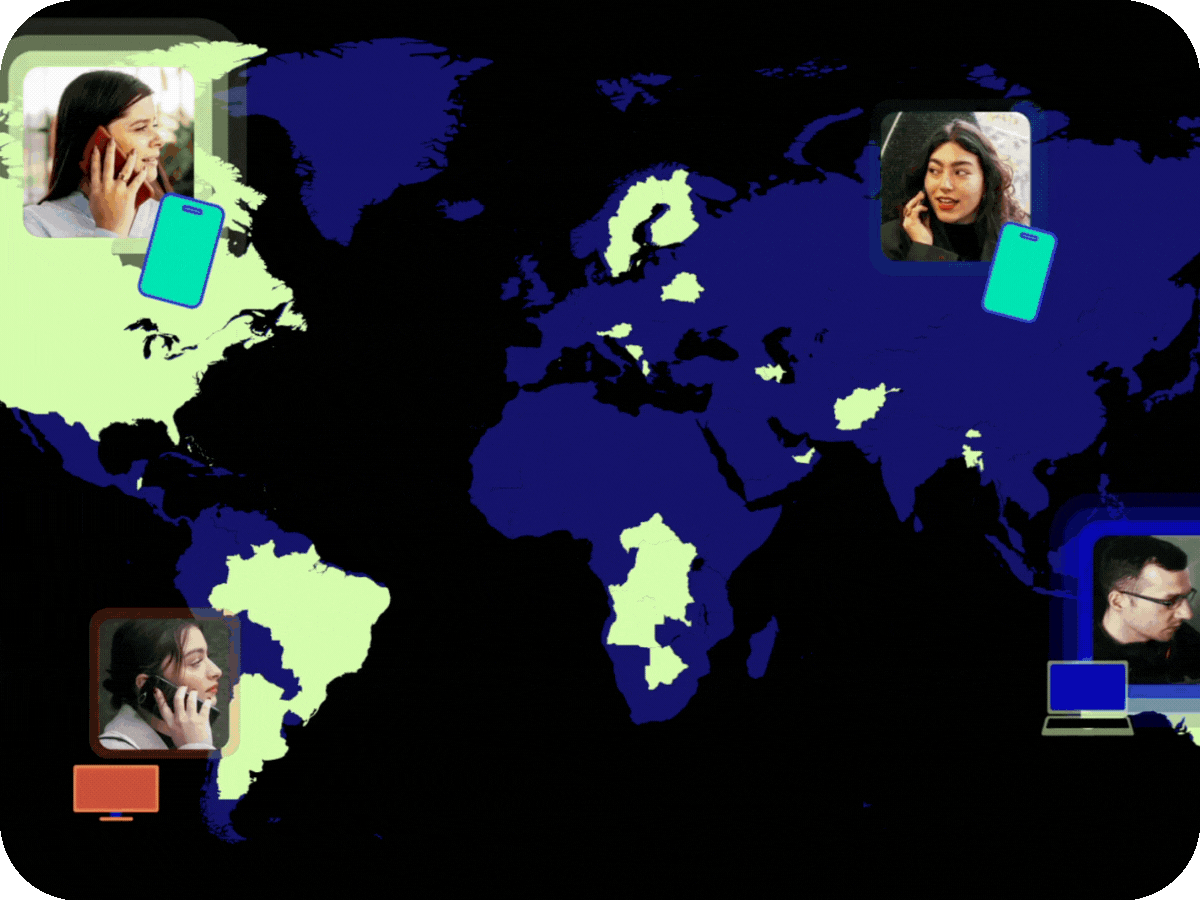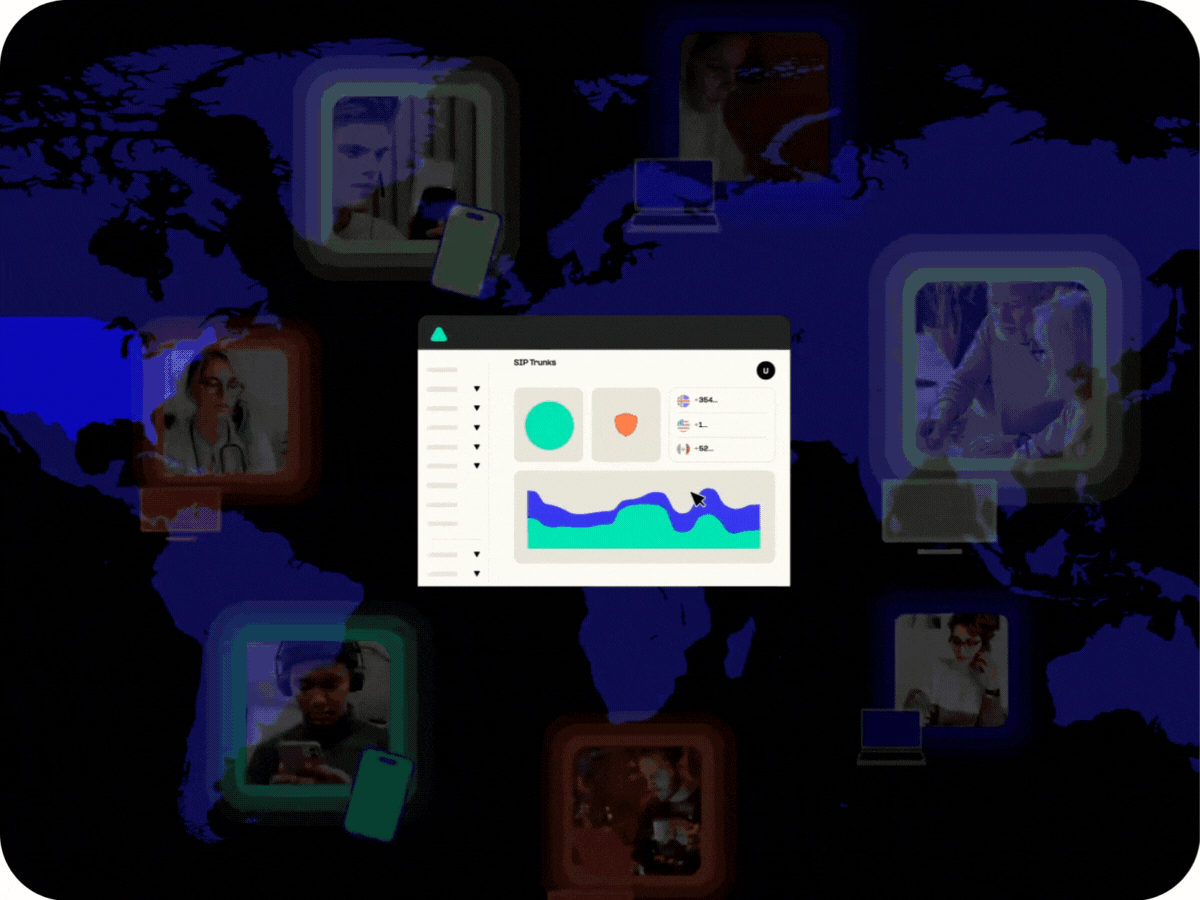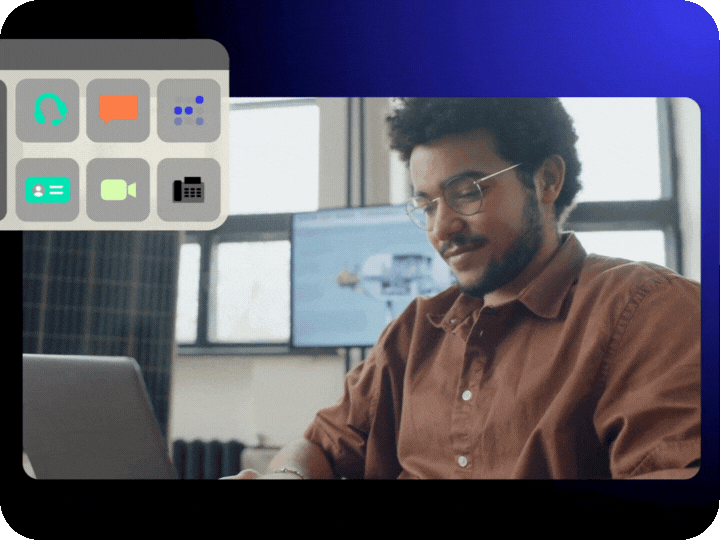



Build ultra-low latency Voice AI Agents in minutes
Unlike competitors who rely on rented infrastructure, Telnyx spent over a decade building a robust, global, carrier-grade voice network. By colocating dedicated GPUs with our telephony PoPs and deeply integrating with Telnyx Voice API, we've created an unmatched foundation for voice AI agents: ultra-low latency, powerful call control, crystal-clear call quality, unmatched reliability, and global-scale
It’s a deep foundation no competitor can replicate. The best part? Because we own the stack, our voice AI agents run at a fraction of the cost of competitors.
Telnyx is the full-stack conversational AI platform that delivers fast, engaging voice AI Agents that you can build in minutes. Give it a try.
Build, test, and deploy powerful AI Agents in minutes
Telnyx gives you the keys to our stack so you can build your custom agents with complete control. Our intuitive no-code builder ensures non-technical builders can create intelligent agents quickly, while our flexible APIs allow developers to build for scale.
User-friendly, no-code UI
Our AI Assistant builder in the Mission Control Portal makes building, testing, and deploying voice AI agents quick and easy, even for non-technical users.
Flexible APIs and MCP support
Developers have full flexibility to build and deploy voice AI agents via API. Leverage the Telnyx MCP server for streamlined agent deployment and management.
Bring your own models
Pick a model from Telnyx’s open source LLM library or bring your own API keys. Swap models anytime, zero lock-in.
Multi-agent handoffs
Seamlessly transfer calls or orchestrate smooth conversations across multiple AI agents on a single call for more realistic, engaging customer experiences.
Comprehensive testing
Confidently launch agents after running automated multi-path simulations and automated tests for accuracy, reliability, and response quality.
Migrate voice AI agents
Instantly migrate your existing AI agents to our platform from Vapi, ElevenLabs, and more. Import agents with a single click and reuse existing voice flows, scripts, and settings without rebuilding.
ENTERPRISE-READY AGENTS
Voice AI agents your customers trust and love
Deliver secure, reliable, and compliant voice AI experiences that scale globally and speak your customers’ language, on robust infrastructure built to earn your customers' trust.
Resources
The best voice AI Agent tools
Choosing the right tools is just the beginning. Building AI experiences requires powerful, dedicated infrastructure, seamless orchestration, and tight control over data and latency.
AI global calling
Learn how Telnyx’s carrier status and private global network enhance AI-powered calling with low-latency, crystal-clear voice, and worldwide scalability.
Reduce your RTT
Every millisecond counts when you’re building natural, real-time conversations with voice AI. When round-trip time exceeds 300 ms, human-to-AI interactions start to feel robotic and frustrating. See how we're solving the problem.
FAQ
Resources, Docs, Support
Voice AI Agents Expert Hub
Find tips, best practices, and guides for building low-latency Voice AI Agents with Telnyx.
Conversational AI Quickstart
Conversational AI enables machines to understand, interpret, and respond naturally to human language.
Voice Assistant Quickstart
In this tutorial, you'll learn how to configure a voice assistant with Telnyx.
Inference API Quickstart
Building AI agents is slow and complex. Telnyx Inference API simplifies deployment with OpenAI compatibility and scalable GPU performance.
Gather using AI API
Manual call data gathering wastes time and frustrates users. Telnyx AI Agents automate, transcribe, and streamline voice inputs for enterprise calls.
Start AI Assistant API
Legacy IVRs frustrate callers and slow support. Telnyx AI Agent APIs automate voice calls with natural speech, improving CX and efficiency.
Stop AI Assistant API
AI agents can create confusion if not managed. Telnyx lets you stop AI assistants instantly, ensuring seamless call control and enterprise security.
Inference APIs
Building enterprise AI agents is complex and time-consuming. Telnyx inference APIs simplify integration, speeding deployment and scaling securely.
Voice APIs
Our Voice products make it possible for you to programmatically manage calls, manage outbound voice traffic, and send/receive faxes.
How to optimize voice AI applications with fine-tuning
Learn best practices and actionable strategies for fine-tuning voice AI applications to enhance real-time processing, accuracy, and user satisfaction.
The Top 5 Voice AI Providers in 2025 [Reviewed]
We ranked the top voice AI platforms for 2025—from real-time agents to global infrastructure—so you can choose the right stack for your build.
How AI voice works and why it’s important
Enterprises struggle with complex voice automation and costly support. Telnyx AI Voice streamlines service, boosts efficiency, and personalizes CX.
Voice AI Agents—Quickly build and launch | Ultra-low latency
Build and launch powerful Voice AI Agents faster and cheaper with Telnyx. Ultra-low latency, unmatched call quality, total control.
Why low-latency is essential for real-time voice AI
Learn how every millisecond impacts voice AI. Explore how Telnyx’s full-stack approach delivers ultra-low latency and smoother voice interactions.
How to build a low-latency voice assistant: Expert insights
Learn how Telnyx engineers tackled latency challenges to build a voice assistant with under-1s response time. Explore solutions in our webinar recording.
Build an AI Assistant with Telnyx
Building voice AI is complex and slow. Telnyx lets any team launch secure, intelligent assistants in minutes, reducing support costs and wait times.
Voice analytics tools: building blocks for telephony and AI
Learn how Telnyx supports conversational AI and voice analytics with plug-and-play APIs to control a global, real-time telephony & communications network.
Customer spotlight: Using Telnyx Voice API with OpenAI
A developer in Turkey leveraged Telnyx and OpenAI to call thousands of pharmacies to find medication during a shortage.
Voice AI Agents—Quickly build and launch | Ultra-low latency
Build and launch powerful Voice AI Agents faster and cheaper with Telnyx. Ultra-low latency, unmatched call quality, total control.
The Better Twilio Alternative - Telnyx
Switch to Telnyx for a better Twilio alternative. Benefit from our competitive pricing, private global network, and award-winning support.
The better Vonage Voice API alternative - Telnyx
Switch to Telnyx for a better Vonage voice alternative. Benefit from our global coverage, excellent support, and flexible APIs..
Voice API Essentials | Telnyx Help Center
In this collection you will find helpful links that explain the mission control portal features and troubleshooting tips.
Real-Time Transcription | Telnyx Help Center
Enable real-time transcription for calls with Telnyx. Enhance user experience now.
Inbound/Outbound Voice | Telnyx Support
Inbound/Outbound Voice configuration guideline materials. Start building on Telnyx today.
Configuring Call Control/TeXML Applications | Telnyx Support
This article describes the in-depth setup of Call Control / TeXML Applications on our Mission Control Portal.
General Voice API Help | Telnyx Support
Get assistance with Telnyx's Voice API: UK TPS, Google Verified Calls, STIR/SHAKEN.
Mission Control Portal - AI Chat Support Assistant | Telnyx Support
A new AI Assistant that helps provide answers to frequently asked questions.
Conversational AI [Integration] Use Cases
Boost engagement and efficiency through Telnyx's Conversational AI. Start integrating now.
Contact Center Solutions - Build Delightful CX
Enhance your contact center's customer experience with omnichannel, carrier-grade communications, delivered via API. Start delivering delightful CX today.





